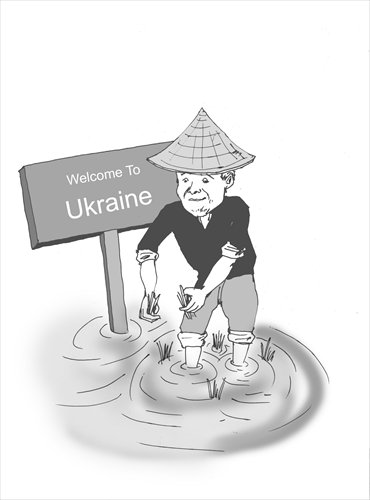HOME >> BUSINESS
Was China’s agricultural land buying spree worth it?
By Chris Dalby Source:Global Times Published: 2016-3-20 21:08:01

Illustration: Luo Xuan/GT
In recent years, an entire sector of business has popped up in China, trying to help the country's public and private agrobusiness companies find tracts of land around the world. China has around 20 percent of the world's population but just 9 percent of its farming land. On the surface, therefore, answering this problem by looking for places to farm internationally makes economic sense. This has seen Chinese companies already buy vast plots in Madagascar, Australia and the USA, among others. However, this has been going on for a number of years now. Therefore, have these ventures offered a long-term profitable agricultural alternative for China or are they fated to remain a niche interest?
The background for China's push into such purchases can be traced back to the early days of the government's Go Out policy, which began in 1999. According to the International Institute for Sustainable Development, this has driven China's overseas agricultural investment, although this sector is still miniscule compared to others. In 2010, Chinese FDI stood at near $300 billion, with agriculture only accounting for 1 percent of that total. This has led to a strange situation.
While China is one of the largest overseas agricultural investors, the comparatively low amounts invested in agriculture, as opposed to finance or mining, long led this sector to fly under the radar. More attention began being paid to China's overseas agriculture after several reports in 2013 listed many such purchases. That year, China made the largest land lease agreement with Ukraine, agreeing to rent up to 3 million hectares of Ukraine's arable land. This caused alarm as, should China use all of this territory, it would be occupying around 5 percent of Ukraine's territory. The civil war which has raged in Ukraine since then has delayed this agreement but the precedent was set.
This deal, worth a reported $2.6 billion, revealed the sheer ambition of China's agricultural ambitions. Land was bought in Brazil and Argentina for soybeans and corn, in Australia to raise cattle for milk, and in Bulgaria for sunflowers. It has not been the only country to plough this furrow, with Brazil acquiring 500,000 hectares in Mozambique for soybeans - although, ironically, much of that crop was sent to China.
Now, China has two major challenges. The first is to ensure it does not pollute or degrade these lands. If that happens, word will eventually spread and finding new destinations for such bumper acquisitions will become far harder. A Xinhua report in November 2014 stated that up to 40 percent of farmland in China might have been degraded, due to contamination or over-farming. While this is the product of years of misuse, it led the Ministry of Agriculture to order new advances into farming techniques and in sustainable agriculture.
Alongside this, making purchases abroad is a priority. This means that Chinese agricultural companies buying land abroad will receive financing support from State financial institutions but will also be mandated to research and deploy new sustainable techniques.
The second major challenge is yield. The weather and soil conditions in the land that China has acquired were researched to be suited for particular kinds of crops. However, the ultimate yield of each crop will be crucial to ensuring China's food security. Specific results for yields from agricultural land leased overseas are very scarce.
In 2010, the World Bank published a report that attacked the secrecy in the way such land lease agreements were negotiated and fulfilled. While it did not attack China directly, it said that many such deals were brokered in secret, with little information about negotiation with communities, about the amount of crops being planted and about the techniques deployed. This secrecy is not what China needs, either in its business dealings, or in its agricultural performance.
China's food security is a complex issue, one which will only grow tougher as the population continues to grow. The bumper leases as seen in Ukraine are not all to be used at the same time. While food security is an issue of national security, a slither of openness in surrounding dealings may give China greater scope to sow its oats in the future.
The author is a Mexico-based analyst of Chinese politics and economics. bizopinion@globaltimes.com.cn
Posted in: Columnists